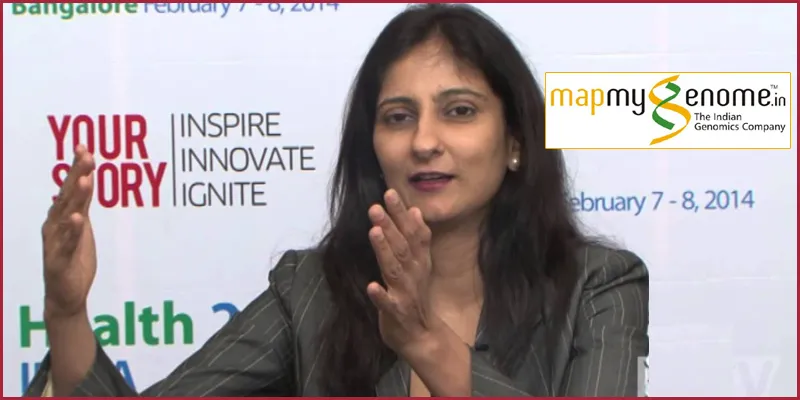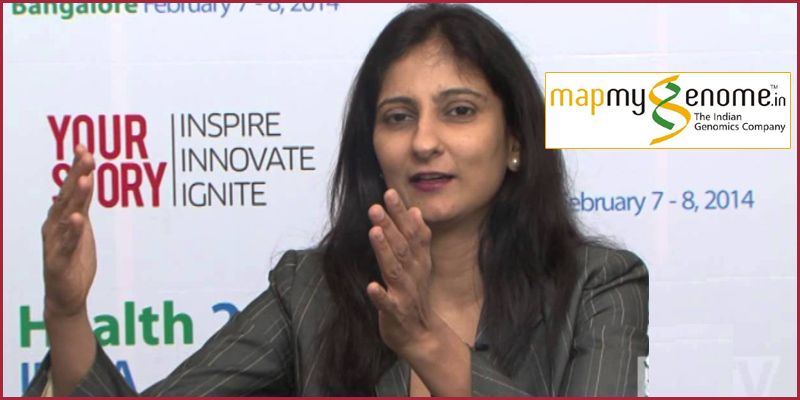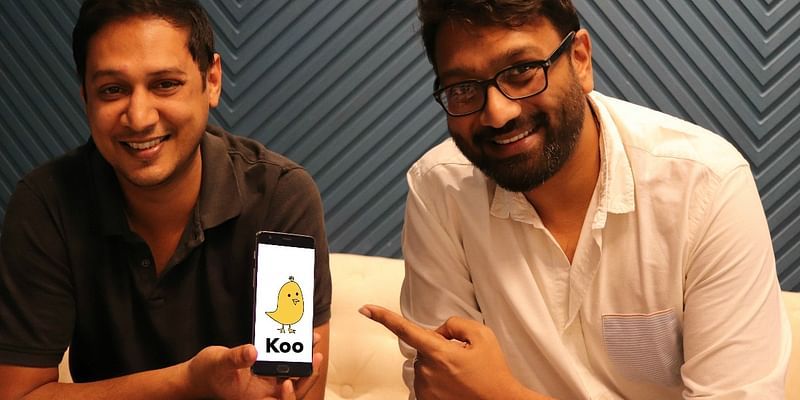From Janamptri to Genomepatri™: The MapMyGenome Story
The entrepreneurial journey of Anu Acharya started in 2000 when she decided to move back to Hyderabad from Chicago. She founded a company, called Ocimum Bio Solutions, which helps scientist do their research.
Ocimum did a verity of things, and they went through 3 acquisitions and two rounds of funding from Kubera Partners and World Bank. Over a period of 14 years, they continued growing the company. For Anu Acharya, all that was great, but not enough. She asked herself, “What is it that you really want to do? The real desire was to be able to create an impact. To create a big impact you have to look at how you actually affect people directly. When you are working merely on research side you are working as a sub contractor to the pharma companies. The process is long. So you are not directly impacting people. That was the main driver to start MapMyGenome.”

How MapMyGenome started
In 2011, Anu started saying, “We should do something else in this space.” It was a tough thing for them ‘to do something else’ because Ocimum Bio was already doing well in the same space. She floated the idea to the current investors and the board of Ocimum Bio to make MapMyGenome as a subsidiary. The board didn’t want a subsidiary which is consumer oriented because it was deviating from the core of Ocimum Bio mandate. Which Anu thinks was a blessing in disguise. MapMyGenome was incubated for two years, and there was an agreement on how many hours Ocimum would devote to MapMyGenome.
Anu Acharya, Founder & CEO of MapMyGenome, remarks, “In 2012, we came up with a basic version of the algorithm. It took a lot of effort because we have to download a lot of data from the database that we already had. (Previously Ocimum Bio had done acquisition of GeneLogic in the US for 150 million dollars.) 22,000 samples is a good sample set on gene expression. It was a very comprehensive database.”
In 2013, Anu left Ocimum Bio to focus on the self-funded startup MapMyGenome full time. The initial conviction was to stay in India as opposed to taking the company to the US. Because of the US-based genomics company 23andMe & FDA, the new startup in Hyderabad has gotten so much of publicity. They didn't have to spend much on marketing.
From Janamptri to Genomepatri™
Genomepatri™ can be described either as a scientifically validated horoscope for health or a personalized genomics profile. Genomepatri™ helps in analyzing an individual’s predisposition to certain diseases, risks that could occur from diet and lifestyle factors and drug responses. It covers about 100 conditions, traits and drug correlations. It gives you a report on your disease pre disposition. That is not all. MapMyGenome also checks if you have certain reaction to certain drugs. If you are 50+ and have diabetics, they’ll check if the drug is going to work for you. Thus it can help aid many people who take the wrong drug for treatment.
Genomepatri™ procedures
They ask you very detailed questions – family history, about your parents, about yourself, sibling, uncle; the questioner is very detailed. Filling up will take 10/20 minute if you already have all the information. Your current medical report will also be required. They have a genetic counselor MBBS & MD & PHD; that means the data will be seen by someone who will look at it from a research point of view, as well as from the doctor’s perspective and also the physician’s. The result also shows whether you have immune related problems, or auto-immune related problems. You’ll get specific answers for symptoms that you developed recently. Regarding misconception and irrational fears, Anu Acharya says, “What you are intrinsically might be different from what’s expressed at this point in time based on your current lifestyle. If you have a health history and your genetic profile, then you can come up with a very interesting understanding of yourself. What’s next is for you to take actionable steps.” MapMyGenom has other product such as, Brainmap™ WebNeuro™, Lung Cancer & Nicotine Dependence Test, CardioMap and few more.
The distribution model and how MapMyGenome plans to scale
Once a startup achieves product-market fit, the next headache is accelerating a scale. The same goes for MapMyGenome. According to Anu, “MapMyGenome is tied up with 38 hospitals. People can directly order online or they can call us and order. Our interface will be the hospitals, fitness/wellness centers and individual distributors we’ve tied up with. MapMyGenome wants to plug itself wherever people go for wellness advice like hospitals or certain type of places like yoga centers. MapMyGenome will go there and work with those people as well.”
She adds, “We can grow, but we’ll grow slowly.” For example, they are now working with KIMMS. They’ve signed up with Dr. Lal’s and have tied up with their diagnostic centers across India where they see 38,000 patients a day. Most hospitals in North India send their lab work to Dr. Lal’s. The company has also a tie up with OnQuest, based in Delhi, with presence across India. They’ve also started getting orders from Singapore and Malaysia.
Arriving at a right price point
For every startup that is introducing something new to the market (that hasn’t been done before) another headache is how to get the price right. MapMayGenome’s tests currently ranges between Rs 1,000 to 25,000. The company started with arbitrary pricing and arrived at the price point that makes sense to them as a startup and for the customer. Anu defends the price point by saying, “Our pricing came in between 23andMe and others who have premium price because we don’t have the ability to wait up to 20 years to make money. As a startup, we don’t want to kill ourselves if we have to lose money in terms of every test that we do.” 23andMe ‘s kind of discounting model makes sense only if there is a game plan after the customer acquisition exercise. But in MypMyGemone case, they started with Rs. 25,000 products, and it seems they’ve sold a fair amount without doing any advertising.
Accuracy of data output & predictability
Anu points out two points, “(1) Accuracy of the platform: it’s clear we use ilummina. There is no doubt our machines are high quality. You don’t have to worry about data output accuracy, as illumina guarantees 99.9% accuracy. (2)The accuracy of the product/test itself; none of the genetic predictive analysis are going to be 100% accurate. It is a predictive test. It is not a diagnostic. It answers ‘What is the probability that you are likely to get it.’ We’ve compared our test with the others’ out there. We don’t do all the diseases others do. One worrisome issue is people don’t read fine prints. For example, in a particular case if there are only 0.2 % incidents in India, we don’t want people to be confused. We have to explain that even when you have high risk, the number of people affected by this particular disease is only 0.2%. You might have high chances of getting it compared to an average person but that doesn’t mean you’ll get it. That is why counseling is very important.”
Know thy self
A long time ago, a ‘gotra’ (same clan) system was active in India and the reason people didn’t marry within their ‘gotra’ was to prevent generational inherited disease. ‘Gotras’ were created so that mutation will not be passed on. ‘Gotras’ are much generalized (probably you’ve forgotten which ‘gotra’ you belong), but now with Genomepatri™ you can find which ‘gotra’ you belong to in a better and accurate form.
Technology advancements have made data collection cheaper and more convenient. So the Quantified Self Movement is a trend that will continue to be with us. Anu exclaims, “People should be more aware of themselves.”
Everybody will have 4 or 5 conditions that are not something to be worried about. Once you know about your conditions make sure you reduce your risk and manage it well.











